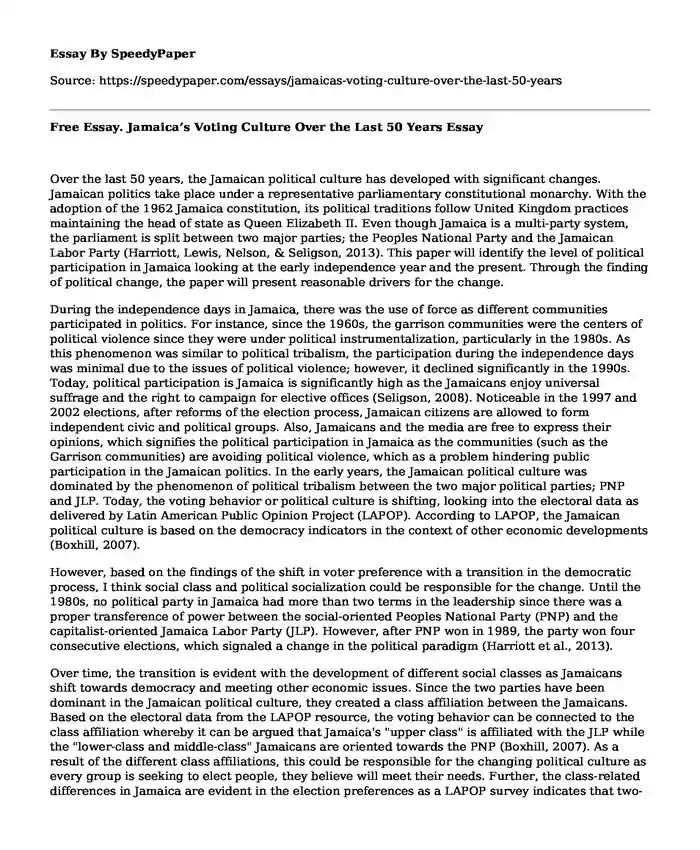
| Type of paper: | Essay |
| Categories: | Democracy Independence Jamaica Community |
| Pages: | 3 |
| Wordcount: | 784 words |
Over the last 50 years, the Jamaican political culture has developed with significant changes. Jamaican politics take place under a representative parliamentary constitutional monarchy. With the adoption of the 1962 Jamaica constitution, its political traditions follow United Kingdom practices maintaining the head of state as Queen Elizabeth II. Even though Jamaica is a multi-party system, the parliament is split between two major parties; the Peoples National Party and the Jamaican Labor Party (Harriott, Lewis, Nelson, & Seligson, 2013). This paper will identify the level of political participation in Jamaica looking at the early independence year and the present. Through the finding of political change, the paper will present reasonable drivers for the change.
During the independence days in Jamaica, there was the use of force as different communities participated in politics. For instance, since the 1960s, the garrison communities were the centers of political violence since they were under political instrumentalization, particularly in the 1980s. As this phenomenon was similar to political tribalism, the participation during the independence days was minimal due to the issues of political violence; however, it declined significantly in the 1990s. Today, political participation is Jamaica is significantly high as the Jamaicans enjoy universal suffrage and the right to campaign for elective offices (Seligson, 2008). Noticeable in the 1997 and 2002 elections, after reforms of the election process, Jamaican citizens are allowed to form independent civic and political groups. Also, Jamaicans and the media are free to express their opinions, which signifies the political participation in Jamaica as the communities (such as the Garrison communities) are avoiding political violence, which as a problem hindering public participation in the Jamaican politics. In the early years, the Jamaican political culture was dominated by the phenomenon of political tribalism between the two major political parties; PNP and JLP. Today, the voting behavior or political culture is shifting, looking into the electoral data as delivered by Latin American Public Opinion Project (LAPOP). According to LAPOP, the Jamaican political culture is based on the democracy indicators in the context of other economic developments (Boxhill, 2007).
However, based on the findings of the shift in voter preference with a transition in the democratic process, I think social class and political socialization could be responsible for the change. Until the 1980s, no political party in Jamaica had more than two terms in the leadership since there was a proper transference of power between the social-oriented Peoples National Party (PNP) and the capitalist-oriented Jamaica Labor Party (JLP). However, after PNP won in 1989, the party won four consecutive elections, which signaled a change in the political paradigm (Harriott et al., 2013).
Over time, the transition is evident with the development of different social classes as Jamaicans shift towards democracy and meeting other economic issues. Since the two parties have been dominant in the Jamaican political culture, they created a class affiliation between the Jamaicans. Based on the electoral data from the LAPOP resource, the voting behavior can be connected to the class affiliation whereby it can be argued that Jamaica's "upper class" is affiliated with the JLP while the "lower-class and middle-class" Jamaicans are oriented towards the PNP (Boxhill, 2007). As a result of the different class affiliations, this could be responsible for the changing political culture as every group is seeking to elect people, they believe will meet their needs. Further, the class-related differences in Jamaica are evident in the election preferences as a LAPOP survey indicates that two-thirds of the Jamaican voters are "lower-class or working class," "middle-class," and "upper-middle-class" individuals (Powell, Bourne, & Waller, 2007).
In conclusion, I think the political socialization could be responsible for the shifting political culture as the values and beliefs of the people define government action and parameters of political life. Through social experiences, people take all the necessary measures to survive, which could include thinking patterns. It means, as the society views the values in connection to politics, they develop a distinct view of the political socialization. Thus, the shift in the political culture in Jamaica from independence to present could be as a result of the political socialization and class affiliation.
References
Boxhill, I. (2007). The political culture of democracy in Jamaica, 2006. LAPOP.
Harriott, A. A., Lewis, B. A., Nelson, K. V., & Seligson, M. (2013). The Political Culture of Democracy in Jamaica and the Americas, 2012: Towards Equality of Opportunity. Retrieved from https://www.vanderbilt.edu/lapop/jamaica/Jamaica_Country_Report_2012_W.pdf
Powell, L. A., Bourne, P., & Waller, L. (2007). Probing Jamaica's political culture. Kingston, Jamaica: Centre for Leadership and Governance, University of the West Indies, Mona. Retrieved from http://gt66acourse.50webs.com/ProbingJamPolCult.pdf
Seligson, M. A. (2008). I. The Rise of Populism and the Left: Challenge to Democratic Consolidation? Challenges to Democracy in Latin America and the Caribbean, 3.
Cite this page
Free Essay. Jamaica's Voting Culture Over the Last 50 Years. (2023, Feb 27). Retrieved from https://speedypaper.com/essays/jamaicas-voting-culture-over-the-last-50-years
Request Removal
If you are the original author of this essay and no longer wish to have it published on the SpeedyPaper website, please click below to request its removal:
- Free Essay about Unsaturated Oils in Human Diet
- The Impact of Corruption on Government Administrative System, Free Essay
- Global Warming Essay Examples
- Increased Risk of Social Isolation - Free Essay on Societal Problems
- Tourism Essay Sample: Promoting Vacationing State of Washington
- Essay Sample Dedicated to Cultural Differences in Communication
- Paper Example on Pathophysiology of Sickle Cell Disease
Popular categories




